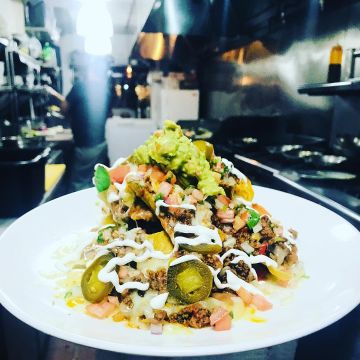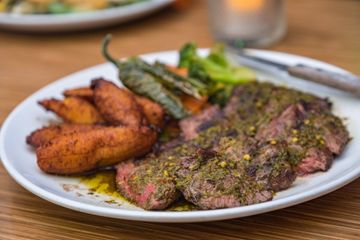Is Mexican Food Healthy And Balanced? Unboxing the Nutritional Advantages of Standard Ingredients
The concern of whether Mexican food is healthy and balanced invites an expedition of its typical ingredients. Beans and corn act as fundamental staples, rich in protein and fiber. Avocados give advantageous fats, while numerous natural herbs and spices add taste and wellness benefits - tacos. With each other, these parts create a tapestry of nutrition. The healthfulness of Mexican food often depends on preparation techniques and part dimensions. What function do these aspects play in establishing its total dietary worth?
The Power of Beans: Healthy Protein and Fiber-Rich Staples
Although often neglected, beans function as a foundation of Mexican cuisine, providing a riches of nutritional benefits. Rich in healthy protein, they are a superb plant-based choice for those looking for to satisfy their dietary healthy protein requires. This high healthy protein material sustains muscle fixing and growth, making beans important for both vegetarians and meat-eaters alike. Additionally, beans are a remarkable resource of nutritional fiber, which aids in digestion and promotes a sensation of fullness, potentially aiding with weight management.
The range of beans used in Mexican recipes, such as black beans, pinto beans, and kidney beans, adds to a diverse flavor account and can enhance meals nutritionally. Furthermore, beans are low in fat and have important nutrients, consisting of folate, iron, and magnesium. With each other, these features make beans a vital ingredient, supplying both nutrition and nutrition in standard Mexican price.

Corn: a Versatile Grain With Nutritional Conveniences
Corn stands apart as a functional grain basic to Mexican food, celebrated not just for its culinary applications but also for its impressive nutritional profile. As a main ingredient in dishes like tortillas, tamales, and pozole, corn provides necessary nutrients that contribute to a well balanced diet plan. Rich in carbs, it functions as a significant power source, while additionally being low in fat, making it a favorable alternative for numerous nutritional needs.
Furthermore, corn is an excellent source of dietary fiber, which aids in digestion and advertises satiation. It contains significant amounts of vitamins such as B-complex vitamins, which are essential for power metabolic rate. The visibility of antioxidants, especially carotenoids, contributes to total health by lowering oxidative stress and anxiety. Additionally, corn is gluten-free, catering to those with gluten level of sensitivities. Generally, the nutritional benefits of corn emphasize its importance in typical Mexican food and its role in a healthy and balanced diet regimen.
Avocados: Healthy And Balanced Fats and Nutrients in Every Bite
Avocados play a substantial duty in Mexican cuisine, enhancing recipes with their velvety structure and rich flavor. Past their cooking appeal, avocados are celebrated for their impressive dietary account. They are an abundant source of healthy and balanced monounsaturated fats, which can help lower bad cholesterol levels and assistance heart wellness. Furthermore, avocados are loaded with crucial nutrients, consisting of potassium, vitamin E, and B vitamins, adding to overall wellness.
The high fiber content in avocados aids digestion and advertises satiety, making them a valuable addition to any dish. Their one-of-a-kind nutrient composition can additionally sustain skin wellness and provide anti-inflammatory benefits. Integrating avocados right into typical Mexican recipes or enjoying them as a standalone treat can boost both flavor and nutrition, demonstrating why they are a beloved staple in Mexican food. On the whole, avocados offer a tasty means to appreciate healthy fats and crucial nutrients in every bite.

Natural Herbs and spices: Flavorful Wellness Boosters
While taking pleasure in the rich tastes of Mexican food, one can not overlook the necessary function that spices and herbs play in improving both preference and wellness. Active ingredients such as cilantro, oregano, and chili peppers not only contribute to the vibrant taste profile but additionally supply substantial wellness advantages. Cilantro is known for its detoxifying homes, assisting to get rid of heavy metals from the body, while oregano is loaded with antioxidants and has anti-inflammatory effects.
Chili peppers, a staple in lots of Mexican dishes, include capsaicin, which has actually been connected to enhanced metabolism and pain relief. Additionally, spices like cumin and coriander assistance digestion and may aid in blood glucose regulation. Incorporating these flavorful health and wellness boosters into meals not just improves the culinary experience yet likewise promotes overall wellness, making Mexican cuisine not just scrumptious, however likewise nutritionally helpful.
Typical Cooking Approaches: Enhancing Nourishment and Taste
Typical food preparation approaches in Mexican cuisine play a vital function in boosting both nourishment and taste, as they frequently focus on time-honored methods and fresh components. Strategies such as nixtamalization, where corn is soaked and prepared in an alkaline remedy, not only enhance the nutrient profile of tortillas however additionally boost their digestibility - lunch and dinner. Furthermore, making use of slow-moving food preparation methods, like cooking or braising, permits tastes to combine perfectly while keeping the honesty of the ingredients

Often Asked Questions
Are Mexican Food Portions Normally Larger Than Other Cuisines?
Mexican food sections are usually larger than those of many other cuisines. This particular shows standard eating techniques, stressing common sharing and hearty meals, which can lead to an extra considerable serving dimension on the whole.
How Does the Prep Work Approach Affect Healthiness of Mexican Food?
Preparation techniques greatly influence the healthiness of Mexican food. Techniques such as grilling or steaming preserve nutrients, while frying can boost undesirable fat web content. Selections of ingredients and cooking designs inevitably figure out total dietary value.
Can Mexican Food Be Customized for Specific Nutritional Restrictions?
Mexican food can indeed be customized for particular nutritional limitations. Substitutions, such as making use of corn tortillas mexican food for gluten-free diet plans or including more vegetables, allow people to delight in standard tastes while suiting numerous dietary requirements.
What Prevail False Impressions Regarding Mexican Food and Wellness?
Usual mistaken beliefs about Mexican food include the belief that it is naturally unhealthy, overly spicy, and exclusively concentrated on fats. In truth, standard meals usually include nourishing ingredients and can be customized to different dietary requirements.
Exist Much Healthier Choices at Mexican Restaurants?
Much healthier alternatives at Mexican dining establishments frequently include barbequed meats, beans, and fresh veggies. Selecting dishes that highlight whole components and avoiding hefty sauces can result in an extra healthy dining experience, advertising overall health.
The variety of beans made use of in Mexican recipes, such as black beans, pinto beans, and kidney beans, contributes to a varied flavor profile and can improve meals nutritionally. Avocados play a significant function in Mexican cuisine, enhancing meals with their velvety structure and rich flavor. Incorporating avocados into typical Mexican recipes or appreciating them as a standalone snack can boost both flavor and nourishment, showing why they are a cherished staple in Mexican food. While delighting in the abundant flavors of Mexican food, one can not forget the crucial duty that spices and natural herbs play in boosting both preference and health. Traditional cooking methods in Mexican cuisine play a necessary duty in improving both nutrition and taste, as they typically focus on time-honored techniques and fresh components.